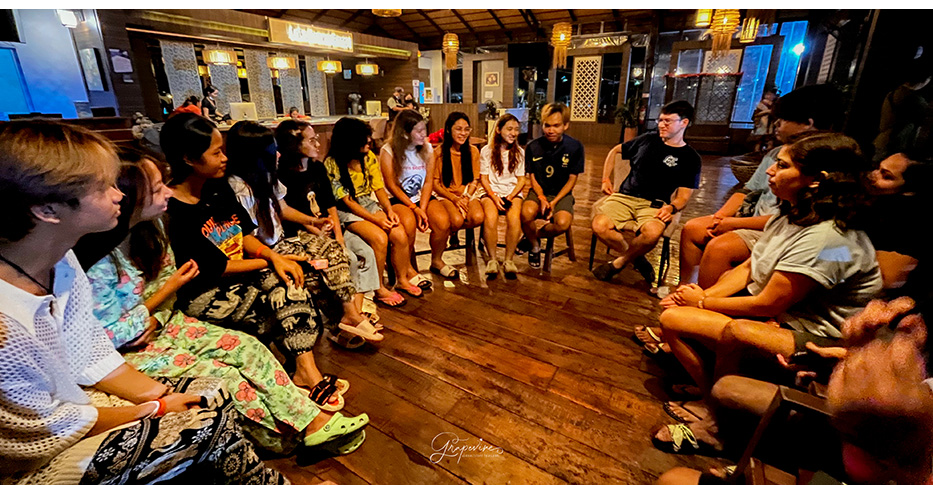By James Thompson
The first check I ever wrote for God bounced.
Well, it would have bounced. I never actually wrote the check because I was in elementary school and didn’t have a checkbook. But I did write a pledge.
It was the Sunday of the annual “Faith Promise Missions Rally” at my home church (First Christian Church of Sylvania, Ga.), and I had just listened to a moving presentation about the need for Christians to support international evangelism efforts. I put down an initial pledge on the commitment card but felt convicted that the amount was too low. After much deliberation, I wrote “$500” on the card and put it in the offering plate.
I suppose the ideal ending to this story would be that I got a summer job or broke open my piggy bank or took out a loan against my allowance and made good on my intention to give half a grand to our congregation’s missions fund. But alas, after realizing that I had probably gotten a bit too excited, I explained the situation to my father, who explained to our pastor that the church would need to lower the pledge drive total just a bit.
My first real attempt at contributing to the advancement of God’s kingdom in the wider world had failed, but the enthusiasm I had felt remained. For a while, I told the adults in my life that I planned to be a missionary when I grew up. That had changed by the time I was in high school, but missions, or some other form of ministry, remained in the back of my mind.
INTRODUCTION TO GLOBALSCOPE
My college years were spent in Athens, Ga., and the UGA Christian Campus Fellowship student ministry became my primary spiritual community. Here, missions slowly started to once again become a bigger blip on my radar. Each week at CCF’s Thursday evening gatherings, one of the staff members or interns would talk about something called Globalscope. They explained that this group started campus ministries like CCF in other countries where Christian student groups are far less common.
Huh. Now there’s an idea.

Globalscope, as I would later learn, started in 2000 as a partnership between the CCF ministry at Georgia Tech and Christian Missionary Fellowship International (CMF), a missions agency with roots in the Restoration Movement. CMF was founded 75 years ago by college students from Independent Christian Church backgrounds at Manhattan Christian College in Kansas. The new organization soon had workers in India, Japan, and Brazil and expanded into many more countries in the ensuing decades. Today, CMF’s missionaries serve in a variety of fields and types of ministries. These include church planting, marketplace ministry, and initiatives to empower poverty-stricken communities. Globalscope is the organization’s international campus ministry division.
The seeds of expansion into international campus ministry were sown through CMF’s REACH program, a long-running summer internship opportunity for college students. The large number of hard-working participants in REACH from Georgia Tech CCF led the two organizations to start considering other ways they could work together. Eventually, they settled on starting a college student ministry in Mexico.
As former Globalscope director Phil Tatum recounted for Christian Standard in 2014, Georgia Tech CCF supplied the “personnel,” and CMF provided “the missions expertise and experience.” Expansion into other countries and campuses soon followed, and the growth has continued despite setbacks and obstacles along the way.
Globalscope currently has 14 ministries in 10 countries (Mexico, Chile, Uruguay, Spain, England, Scotland, Germany, the Netherlands, Thailand, and Australia). Along with this growth has come a noticeable diversification in the ranks of Globalscope missionaries. Georgia Tech CCF alumni serve alongside many from other campus ministries and universities. Even more exciting is the increasing number of campus ministers from outside of the U.S. who have joined Globalscope teams!
A CONFIRMED SENSE OF CALLING
I gradually began to feel a pull toward this type of ministry and Globalscope. After graduating from UGA, I spent a year abroad through a secular cultural exchange program and had a chance to see a couple of Globalscope ministries in action. This helped confirm the sense of calling that I had been wrestling with, and I applied to serve as an international campus minister soon after my exchange program was over. CMF placed me with Grapevine, the Globalscope ministry in Thailand.

Located about an hour outside of Bangkok, Grapevine (named with John 15:5 in mind) is one of the oldest Globalscope ministries. In my opinion, it is also the most unique. In addition to being the only Globalscope presence in Asia, it is also the only one of our ministries situated in a pre-Christian cultural context. All other teams serve in post-Christian or nominally Christian cultures. Student ministry is certainly important and needed in all of the above, but these different environments present different challenges.
In Europe or South America, there may be negative feelings or misunderstandings toward faith that campus ministers need to help their students work through. In Thailand, where the population is approximately 95 percent Buddhist and around 1 percent Christian, students are more likely to have little or no background knowledge about Christianity at all. My teammates and I are sometimes the first Christians that our students have really gotten to know in their lives.
While many of our events (free dinners, holiday parties, outdoor gatherings) are similar to those of a campus ministry in the United States, we have to remember not to assume any substantial familiarity with Jesus when we share with them about our beliefs.
Student ministry in Thailand presents many challenges. Many of these are predictable, even biblical: the soil often seems less than fertile, and the workers are few. My teammates and I (Grapevine is led by a wonderful Filipino couple who have served here for 10 years) have at times been frustrated by the lack of visible progress we are making. But we’re learning not to be as easily discouraged when visible fruit is slow in appearing. We’re sowing seeds, and God will harvest them in his time.
Sometimes, however, we begin to see signs of spiritual growth happening at a surprising rate. We notice students becoming deeply invested in our community. We hear students asking deep questions during the discussion portions of our events. Some students readily agree to read one of the Gospels for the first time and meet weekly to talk about it. Most exciting, of course, is when a student makes a decision to begin following Christ.

A MISSIONARY GOD
Starting when I made that ambitious pledge in church so many years ago and continuing into the first few years of my missionary career, I thought about “missions” as something that Christians did for God. But I’ve realized that’s not right. God, rather than Christian believers, is the primary initiator and practitioner of mission. With or without us, he is at work throughout the world bringing people into his kingdom. He graciously invites us to join him in that work.
When we allow missions to be a human-directed effort that we pursue on God’s behalf, we’ll always end up writing checks we can’t cash. Those who are called to an intercultural ministry vocation are not missionaries for God. Rather, they are partners with One who is himself a missionary God. No matter where they are sent, God was there ahead of them, working in the lives and hearts of the people they encounter. Following his leading and having the patience to accept his timeline are essential for the faithfulness and fruitfulness of any missionary endeavor.
Several semesters ago, there was a student at our ministry who I wanted to invite to join a Bible study. I was fearful, however, that he might react negatively to this idea and withdraw from our community of students. Despite these worries, I went ahead and raised the topic as nonchalantly as I could. I needn’t have worried. It turned out that he had recently become interested in learning more about the Bible anyway and had even been reading some on his own.
As always, God was already at work. He was just waiting for me to join him.
James Thompson is an international campus minister with Globalscope and a freelance journalist.

What a blessing to find a CCF Alum ministering in Thailand! James Thompson is serving Jesus on the front lines. I visited the Grapevine many years ago and found the students there to be delightful but quite culturally entrenched in Buddhism, It is truly one of the most resistant mission fields in the world, which makes campus ministry the perfect vehicle to make first contact. The Good News that God HAS reconciled us to Himself through Jesus is omnicultural and powerful especially to students tired of striving to achieve enlightenment. Salvation is the gift of God. Men and women like James Thompson are the bearers of this Grace willing to patiently love students until Jesus puts them alongside the right person at the right time.